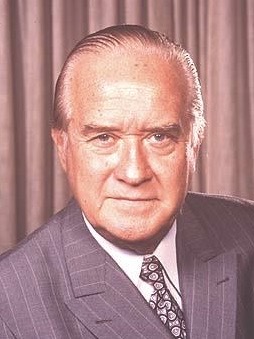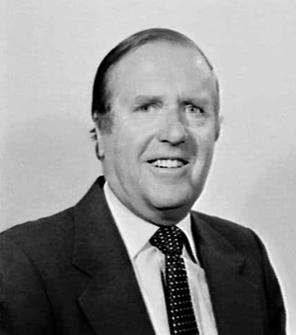Related Research Articles

Sir Robert William Askin, GCMG, was an Australian politician and the 32nd Premier of New South Wales from 1965 to 1975, the first representing the Liberal Party. He was born in 1907 as Robin William Askin, but always disliked his first name and changed it by deed poll in 1971. Before being knighted in 1972, however, he was generally known as Bob Askin. Born in Sydney in 1907, Askin was educated at Sydney Technical High School. After serving as a bank officer and as a Sergeant in the Second World War, Askin joined the Liberal Party and was elected to the seat of Collaroy at the 1950 election.

Sir William John McKell, was an Australian politician who served as the 12th Governor-General of Australia, in office from 1947 to 1953. He had previously been Premier of New South Wales from 1941 to 1947, as leader of the Labor Party.

Barrie John Unsworth is an Australian former politician, representing the Labor Party in the Parliament of New South Wales from 1978 to 1991. He served as the 36th Premier from July 1986 to March 1988. Since the death of Steele Hall on 10 June 2024, Unsworth is the oldest living premier of an Australian state.
The Government of New South Wales, also known as the NSW Government, is the governing body of New South Wales, Australia. The executive government comprises 11 portfolios, led by a ministerial department and supported by several agencies. There are also a number of independent agencies that fall under a portfolio but remain at arms-length for political reasons, such as the Independent Commission Against Corruption and Electoral Commission. The state Executive Council, consisting of the governor and senior ministers, exercises the executive authority through the relevant portfolio.

The Parliament of New South Wales, formally the Legislature of New South Wales, is the bicameral legislative body of the Australian state of New South Wales (NSW). It consists of the monarch, the New South Wales Legislative Assembly and the New South Wales Legislative Council. Each house is directly elected by the people of New South Wales at elections held approximately every four years. The legislative authority of the parliament derives from section 5 of the Constitution Act 1902 (NSW). The power to make laws that apply to New South Wales is shared with the Federal Parliament. The houses of the New South Wales Parliament follow the Westminster parliamentary traditions of dress, green–red chamber colours and protocols. The houses of the legislature are located in Parliament House on Macquarie Street, Sydney.

Neville Kenneth Wran, was an Australian politician who was the Premier of New South Wales from 1976 to 1986. He was the national president of the Australian Labor Party (ALP) from 1980 to 1986 and chairman of both the Lionel Murphy Foundation and the Commonwealth Scientific and Industrial Research Organisation (CSIRO) from 1986 to 1991.

Nicholas Frank Hugo Greiner is an Australian politician who served as the 37th Premier of New South Wales from 1988 to 1992. Greiner was Leader of the New South Wales Division of the Liberal Party from 1983 to 1992 and Leader of the Opposition from 1983 to 1988. Greiner had served as the Federal President of the Liberal Party of Australia from 2017 to 2020. He served as the Consul-General in the United States of America, New York from 2021 to 2023.

Sir Eric Archibald Willis was an Australian politician, Cabinet Minister and the 34th Premier of New South Wales, serving from 23 January 1976 to 14 May 1976. Born in Murwillumbah in 1922, Willis was educated at Murwillumbah High School and the University of Sydney, where he obtained a Bachelor of Arts with double honours. Enlisting during World War II, Willis served on the homefront and later served in New Guinea and the Philippines. He continued to serve the Citizen Military Forces until 1958.

John Brophy Renshaw was an Australian politician. He was Labor Premier of New South Wales from 30 April 1964 to 13 May 1965. He was the first New South Wales Premier born in the 20th century.

Robert James Heffron, also known as Bob Heffron or R. J. Heffron, was a long-serving New South Wales politician, union organiser and Labor Party Premier of New South Wales from 1959 to 1964. Born in New Zealand, Heffron became involved in various Socialist and labour movements in New Zealand and later Australia before joining the Australian Labor Party. A prominent unionist organiser, we was gaoled for "conspiracy to strike action". He was later elected to the Parliament of New South Wales for Botany in 1930. However his disputes with party leader Jack Lang led to his expulsion from the ALP in 1936 and Heffron formed his own party from disgruntled Labor MPs known as the Industrial Labor Party. The success of his party enabled his readmission to the party and his prominence in a post-Lang NSW Branch which won office in 1941.

Leon Ashton Punch was a New South Wales politician, Deputy Premier, and Minister of the Crown in the cabinets of Sir Robert Askin, Tom Lewis and Sir Eric Willis. From 1975 to 1976 he was the Deputy Premier of New South Wales. He was a member of the New South Wales Legislative Assembly for 26 years from 21 March 1959 until his retirement on 2 July 1985 for the Country Party, renamed the National Party during his time.
John Joseph Aquilina, an Australian former politician, is a former member of the New South Wales Legislative Assembly representing the electorate of Blacktown between 1981 and 1991 and the electorate of Riverstone between 1991 and 2011 for the Labor Party.
Ronald Joseph Mulock AO KCSG was an Australian politician. A former City of Penrith mayor, he was an Australian Labor Party member of the New South Wales Legislative Assembly from 1971 to 1988. He was Deputy Premier of New South Wales under Neville Wran and Barrie Unsworth from 1984 to 1988.

William Peter Coleman was an Australian writer and politician. A widely published journalist for over 60 years, he was editor of The Bulletin (1964–1967) and of Quadrant for 20 years, and published 16 books on political, biographical and cultural subjects. While still working as an editor and journalist he had a short but distinguished political career as a Member of the New South Wales Legislative Assembly from 1968–1978 for the Liberal Party, serving both as a Minister in the State Cabinet and in the final year as Leader of the New South Wales Opposition. From 1981–1987 he was the member for Wentworth in the Australian House of Representatives.
Donald Thomas Harwin is an Australian politician. He was the New South Wales Special Minister of State and the Minister for the Public Service and Employee Relations, Aboriginal Affairs, and the Arts in the second Berejiklian ministry since April 2019; and the Vice-President of the Executive Council, and the Leader of the Government in the Legislative Council since January 2017 in the Berejiklian government. He briefly resigned from his roles with effect from 15 April 2020, however was reinstated on 3 July 2020.

The 2011 New South Wales state election held on Saturday, 26 March 2011. The 16-year-incumbent Labor Party government led by Premier Kristina Keneally was defeated in a landslide by the Liberal–National Coalition opposition led by Barry O'Farrell.

John Lloyd Waddy, was a senior officer and aviator in the Royal Australian Air Force (RAAF), and later served as a member of the New South Wales Legislative Assembly and as a minister in the New South Wales government. As a fighter pilot during World War II, he shot down 15 enemy aircraft during the North African campaign, becoming one of Australia's top-scoring aces and earning the Distinguished Flying Cross. Waddy went on to command No. 80 Squadron in the South West Pacific, where he was awarded the US Air Medal. He was one of eight senior pilots who took part in the "Morotai Mutiny" of April 1945.

The New South Wales Labor Party, officially known as the Australian Labor Party and commonly referred to simply as NSW Labor, is the New South Wales branch of the Australian Labor Party (ALP). The branch is the current ruling party in the state of New South Wales and is led by Chris Minns, who has served concurrently as premier of New South Wales since 2023.
Rodney Mark Cavalier is a former Australian politician, statutory officer and author. Cavalier was a member of the New South Wales Legislative Assembly representing Fuller between 1978 and 1981 and then Gladesville between 1981 and 1988 for the Labor Party. During his term in parliament, Cavalier was Minister for Energy, Minister for Finance, and Minister for Education in the Wran and Unsworth governments.

The Willis–Punch ministry or Willis ministry was the 70th ministry of the New South Wales Government, and was led by the 34th Premier of New South Wales, Sir Eric Willis in a Liberal Party coalition with the Country Party of Australia, that was led by Leon Punch.
References
- ↑ "Honorary Awards". University of Sydney. 30 May 2008. Retrieved 6 February 2014.
- ↑ "MEMBER (AM) IN THE GENERAL DIVIS ION OF THE ORDER OF AUSTRALIA" (PDF). Commonwealth of Australia. 2013. p. 54. Retrieved 6 February 2014.
- ↑ P Coleman, The Bulletin, 17 January 1970
- ↑ Clune, David; Smith, Rodney, 1961- (2012). From Carr to Keneally : Labor in office in NSW 1995–2011. Allen & Unwin. ISBN 978-1-74237-663-9.
{{cite book}}: CS1 maint: multiple names: authors list (link) CS1 maint: numeric names: authors list (link) - ↑ DB Waterson, ‘[Review of] A History of the Australian Labor Party in NSW 1891–1991’, Labour History, vol 65, Nov 1993.
- ↑ JR Nethercote, SMH, 2 April 2013.
- ↑ NK Wran, Launch of The Premiers of NSW, Friday 31 March 2006, NSW Parliament, 2006